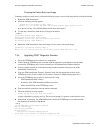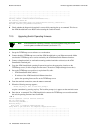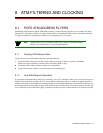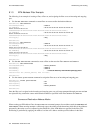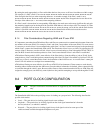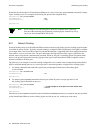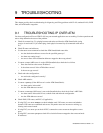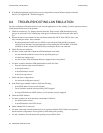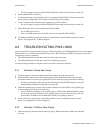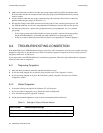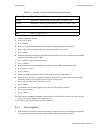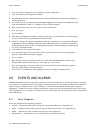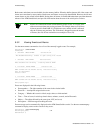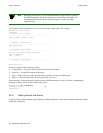
SmartSwitch ATM User Guide 9-1
9 TROUBLESHOOTING
This chapter provides basic troubleshooting for diagnosing and fixing problems with VLAN, emulated LANs, PNNI
links, and ATM traffic congestion.
9.1 TROUBLESHOOTING IP OVER ATM
You have configured an IP over ATM VLAN, but your network applications are not working. Use these questions and
tests to help determine the cause of the problem.
1. Check for connectivity: Try pinging between end nodes and from the ATM SmartSwitch (using
ping) to its end nodes. If you cannot ping, check physical connectivity (disconnected cable and so
on).
2. Check IP routes and addresses.
• Use the show route command to check the ATM SmartSwitch route table.
- Are the destination addresses correct for the specified gateways?
- Are there any routing loops?
- Are one or more of the destination addresses mapped to the wrong subnet?
• Use show client (ARP server is on the ATM SmartSwitch) to check the local client.
- Does the client have the correct IP address?
- Is the subnet correct? Is the ATM address correct?
- Is the server type correct?
• Check end node configurations.
- Are end nodes configured correctly?
3. Check ARP statistics.
• Use show ipatmarp (if the ARP server is on the ATM SmartSwitch).
- Are there entries in the table?
- Are the ATM addresses correct?
• Use show clientarp (ARP server is not on the SmartSwitch) to check local client’s ARP Table.
- Are there entries in the table? If not, recheck client and end node configuration.
- Are the ATM addresses correct?
4. Check ILMI, UNI routes, and PVCs (if applicable).
• If using SVCs, use show ATMRoute to check whether static UNI routes are correct and whether
dynamic UNI routes are established and correct. If dynamic routes are incorrect or missing, try
creating static routes instead.
• If using PVCs, use show pvc to check if PVCs connect the correct resources through the correct
ports.
• If using PVCs, use show ipatmpvc to check if local switch clients are mapped to the correct end node
IP addresses.



